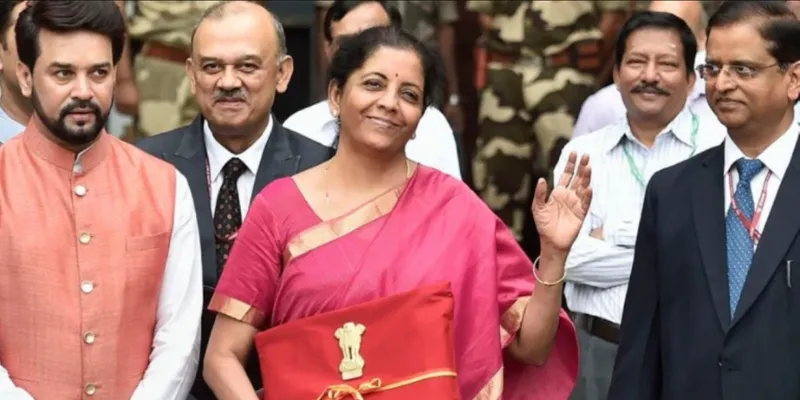Budget 2019: Startups get the spotlight in Nirmala Sitharaman's maiden Budget
The single biggest shining spot in Finance Minister Nirmala Sitharaman’s maiden budget is its focus on startups.
The single biggest shining spot in Finance Minister Nirmala Sitharaman’s maiden budget is its focus on startups.

Finance Minister Nirmala Sitharaman before the presentation of the Union Budget 2019 in New Delhi on July 5. (Image: PTI)
Watch out for YourStory and Kalaari Capital's report on Budget 2019 tomorrow and how startups stand to gain from the measures announced.
For starters, she has begun the process of clearing the tax mess that had discouraged smart young people from turning their ideas into businesses. The FM has said, “Startups and their investors who file requisite declarations and provide information in their returns will not be subjected to any kind of scrutiny in respect of valuations of share premiums.”
Sitharaman also said that the identity of those who invest in startups will now be established by a simple process of e-verification. That means the taxman will no longer be empowered to scrutinise the source of funds raised by startups.
Right now, when a startup raises money from a Category-I AIF (Alternate Investment Fund), it doesn’t need to justify how they arrived at the fair market value of the shares issued. The FM has now extended this to Category-II AIFs as well, allowing startups to raise money from private equity funds, debt funds, and real estate funds, without having to justify fair market value of the shares issued to these funds.
These are very important changes for the startup ecosystem. Startups are essentially smart ideas that are funded by ‘angels’ to turn them into real businesses.
Anyone who understands the basics of valuation knows that early stage investments involve much higher risk than putting in money in established companies. So, angel investors have to accept that many of their bets will lose money, while a few of them will become multi-baggers. Valuing startups, therefore, is part-science and part-experience.
Startups also burn cash as they try to build their brand, acquire customers, and expand revenue-streams. That means, angel investors come in at various stages of the startup's early life to sustain it financially.
Each round of funding takes place at different valuations, depending on changes in the way investors assess the company’s prospects.
Easing regulations
In 2018, the Income Tax department had taken recourse to two little-known sections of the Income Tax Act to make tax demands on startups. The first, under Section 56(2)(vii-b), which treats the difference between valuation of a startup’s shares in various financing rounds as income and taxes it. While this section is ostensibly aimed to stop money-laundering in the guise of angel investments, it has ended up as a tool to extort taxes from young struggling entrepreneurs.

Income tax officials, untrained in valuation methods, have taken the lowest valuation as ‘fair market-price’ and treated anything above it as income. This has resulted in huge tax demands and even fines.
Another section that was being used to send notices to startups is Section 142(1) of the Income Tax Act. Under this, tax officials can ask for previous tax returns, bank details, credit-worthiness, source of income, and correspondence of angel investors who have funded startups. This was nothing short of harassment for hard-working young entrepreneurs who spent all their waking hours trying to make their businesses work.
The finance minister’s announcements have — at least in principle — put an end to these practices of tax terrorism. Of course, the proof of the pudding will be in how it works on the ground, when IT officers interpret these changes. Even here, Sitharaman has put in place a system of checks and balances by saying that even pending enquiries and verifications can only be done by an assessing officer after getting approval from a supervisory officer.
The Budget doesn’t stop only at solving the Angel Tax problem. It has also relaxed norms for startups to carry forward losses from previous years, to offset tax liabilities once the startup begins to make profits.
Now, if all the original shareholders continue to be part of a startup, it can carry forward losses. Even if some of the original shareholders have left, if the promoters continue to hold at least 51 percent of the shares, the startup will be eligible to carry forward losses. This is a significant decision as it will give young entrepreneurs more staying power and improve their ability to sustain immediate losses, knowing that they’ll get tax benefits in the future.
New entrepreneurs have also got two more years of capital-gains holiday if they sell their homes to fund their startups. This is crucial, because increasingly investors want to know whether young people with good ideas are willing to put their money where their mouth is. Not having to pay capital gains, makes it easier for a promoter to sell their house and invest the proceeds in their businesses, effectively making the cost of their own capital 20 percent cheaper. Even the shareholding norms to avail this capital gains tax concession has been eased.

TV channel for startups
There are some other interesting ideas in this Budget to encourage startups. The dedicated TV channel for startups will allow more and more people to present and propagate their ideas and to interface with investors. It will also help them build their brands and reach out to potential customers and clients.
There are other indirect positive effects on startups as well. Allowing 100 percent FDI in insurance intermediaries and reducing the local sourcing norms in single-brand retail will help startups in these spaces.
The plans to allow more FDI in aviation, animation, CGI, and insurance will also encourage startups in these sectors. The plans to strengthen banks, NBFCs, and the debt and bond markets will also help startups to find sources for tapping funds.
Ultimately, a Budget document is a statement of intent and an overall spending plan. Governments no longer wait for that one day in the year to announce all its new policies.
The Modi government has shown that it is keen to encourage entrepreneurship to solve India’s employment problem. Creating a suitable environment for startups is a key part of this resolve.
Hopefully, we will see many other policy changes, including reserving some government contracts for startups to make India a startup nation and the hub of innovation.
(This article was co-authored by Saurav Banerjee and Aunindyo Chakravarty. Saurav is a Venture Partner at Kalaari Capital. Aunindyo is a television anchor & columnist, specialising in political economy and business. He was Senior Managing Editor at NDTV, heading NDTV’s Hindi & business channels. He currently anchors and produces the popular show Simple Samachar on NDTV India. )
(Disclaimer: The views and opinions expressed in this article are those of the author and do not necessarily reflect the views of YourStory.)








